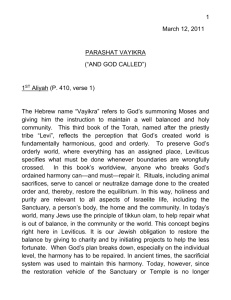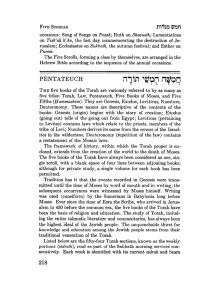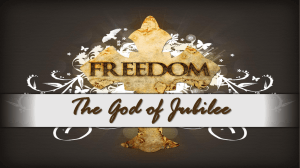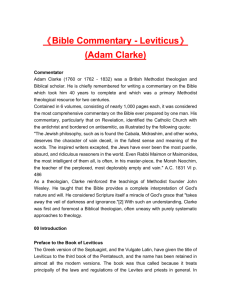B'har-B'chukotai - Temple Beth El of Quincy
advertisement
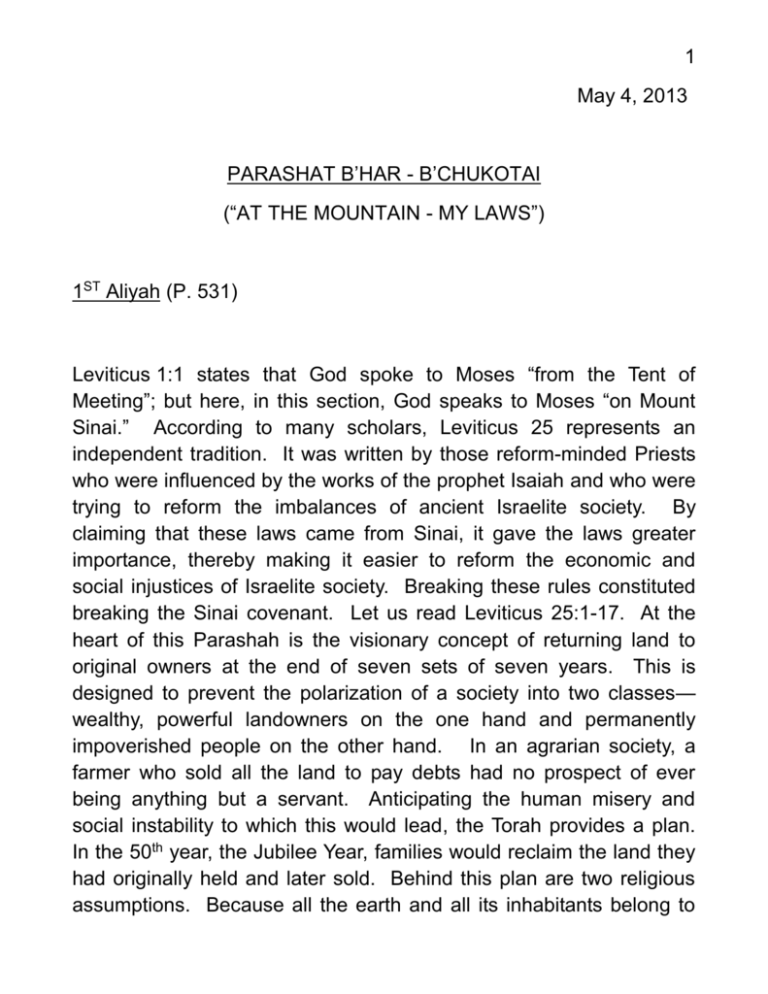
1 May 4, 2013 PARASHAT B’HAR - B’CHUKOTAI (“AT THE MOUNTAIN - MY LAWS”) 1ST Aliyah (P. 531) Leviticus 1:1 states that God spoke to Moses “from the Tent of Meeting”; but here, in this section, God speaks to Moses “on Mount Sinai.” According to many scholars, Leviticus 25 represents an independent tradition. It was written by those reform-minded Priests who were influenced by the works of the prophet Isaiah and who were trying to reform the imbalances of ancient Israelite society. By claiming that these laws came from Sinai, it gave the laws greater importance, thereby making it easier to reform the economic and social injustices of Israelite society. Breaking these rules constituted breaking the Sinai covenant. Let us read Leviticus 25:1-17. At the heart of this Parashah is the visionary concept of returning land to original owners at the end of seven sets of seven years. This is designed to prevent the polarization of a society into two classes— wealthy, powerful landowners on the one hand and permanently impoverished people on the other hand. In an agrarian society, a farmer who sold all the land to pay debts had no prospect of ever being anything but a servant. Anticipating the human misery and social instability to which this would lead, the Torah provides a plan. In the 50th year, the Jubilee Year, families would reclaim the land they had originally held and later sold. Behind this plan are two religious assumptions. Because all the earth and all its inhabitants belong to 2 God, human beings cannot possess either land or the people in perpetuity. And no human being should be condemned to permanent servitude. This concept certainly applies to our difficult times when many people are out of work, have lost their retirement funds and even their homes. Leviticus 25 is as relevant today as it was in ancient times. The question remains, however, how should our country try to avoid becoming a two tier society? 2nd Aliyah (Sha ne) (P. 534, verse 19) Two famous lines come from this Parasha. They are: “You shall proclaim liberty [release] throughout the land for all its inhabitants”, which is, of course, the verse on the Liberty Bell; and, “Do not wrong one another, but fear Your God...” (Leviticus 25:10 and L25:17). We have, in these verses, two far thinking prophetic views. Upon reading these social reforms the modern reader is almost taken aback by the sweeping quality of the social idealism of the Jubilee Year laws. Freedom, giving back the land, human dignity, and the land belongs to God are noble ideas. The underlining theoretical philosophy, stated in B’har, must be the standard of any society. Rabbi Kook taught that the purpose of the Jubilee was primarily spiritual, not economic. But as we Jews know, the spiritual affects the physical. Can you give any examples of this? That’s the point of Leviticus! Living in the world is not easy. In today’s world, jobs, banks, investing, buying property, credit cards, education and working occupy people’s lives. To maintain human dignity, in a capitalistic society, it is necessary to combine the spiritual with the way people live. Leviticus doesn’t separate its rituals from its moral laws. The ideal society envisaged by the prophets is one in which each person is able to sit ‘underneath his/her own vine and fig tree’ (Micah 4:4). This should be 3 a lesson for our society. Holiness, including the way we treat others, must be part of our laws and our every day existence. 3rd Aliyah (Shileshe) (P. 535, verse 29) Judaism, according to Rabbi Jonathan Sacks, is a religion of a people born in slavery and longing for redemption; and the great assault of slavery against human dignity is that it deprives that person of the ownership of the wealth he/she creates. At the heart of the Hebrew Bible is the God who seeks the free worship of free human beings. One of the most powerful defenses of freedom is private property as the basis of economic independence. The free economy uses the fuel of competition to sustain the fire of invention. The market economy is the best system we know for alleviating poverty through economic growth. However, the market economy is better at producing wealth than distributing it equitably. How does health care fit into a free society? In the words of Ha-Joon Chang, a Korean economist, ‘a capitalistic economy needs careful regulation and steering’. At the heart of these laws should be a profoundly humane vision of society. The Biblical authors drew on ancient traditions and memories when they formulated their proposals for economic and social reform. The Biblical legislation presented, in this portion, tells us that an economic system must exist in a moral framework. It need not aim at economic equality but must respect human dignity. No one said it better than Isaiah: Seek justice, encourage the oppressed, Defend the cause of the fatherless, Plead the case of the widow… 4 4th Aliyah (Rive-e) (P. 536, verse 39) Slavery was a universal institution in the ancient world and no one, even the Torah, proposed abolishing it. Some consciences in Israel were troubled by it. Most slavery of the Israelites in the Torah is referring to an indentured servant. A person who is in dire straits may sell himself or a member of his family in a type of labor contract. As we can see in Deuteronomy 15:1-10, the person’s debt is cancelled in the seventh year. In Leviticus, after 50 years, all slaves or indentured servants are set free and all lands revert to their original owners. This Torah attitude toward slavery is revolutionary. It moderated, at that time, a necessary evil. There was no Social Security or security blanket. Most people were on their own, subject to the difficulties of the natural environment. The Torah offers the indentured servant a way out. It also forces the slave owner to moderate his behavior. The slave, the indentured servant, could not work on Shabbat. He or she had to be treated with respect. Moreover, the Torah penalizes the slave owner for grossly mistreating his slaves. The Torah, although not banning slavery, is pointing in that direction and is a document calling for change. Still, there are places, in today’s world, who haven’t heard the Torah’s call for human dignity and freedom. Can you give any examples of these places? The Hebrew Bible has been used by future minded people to outlaw slavery. When society was ready to abolish slavery, the Hebrew Scriptures were able to act as a blueprint. 5 5th Aliyah (Ha meshe) (P. 543, verse 10) B’Chukotai presents an epilogue to the Book of Leviticus as a whole. God addresses the Israelites who are about to enter the Promised Land, assuring them of great rewards if they follow God’s instructions and threatening them with a series of increasingly severe punishments if they disobey. Two major principles of Biblical religion find their expression in this epilogue—the concept of free will and the doctrine of reward and punishment. Obedience to God’s brings reward; disobedience brings dire punishment. The choice is left to the people and their leaders. Is there truth in these statements? The curses, in this section, are known as the “Tokhehah” (reproach). The curses are spelled out at length, in the hope that they will put fear into the hearts of those who cannot be persuaded to do what is right by any other means. In many synagogues it is customary to read the Tokhehah in an undertone, perhaps because its vision of disaster is so frightening. The idea of collective responsibility is at the heart of this section. The stability of a nation depends largely upon the honesty of its citizens and justness of its institutions. Just look at the stock market and banking crash we recently experienced. Individual immoral behavior affected entire societies. Personal integrity leads to group integrity. The recent events at the Boston Marathon verify a breakdown in moral behavior not only by the terrorists but also by part of the Muslim community which fails to speak against those, in their community which preach hatred. If we, indeed, have free choice, evil must exist, even if it hurts the innocent. If the mitzvoth are followed, however, God states, “I will look with favor upon you…” This is very comforting and may be the best way to control earthly events. 6 6th Aliyah (She she) (P. 547, verse 2) This section discusses various endowments pledged to the Sanctuary. It is interesting, sociologically, to read. A male from 20 to 60 years of age gives fifty shekels of silver; a female gives 30 shekels. If the age is from 5 years to 20 years, the equivalent is 20 shekels for a male and 10 shekels for a female; for a child one month to five years for a male is five shekels of silver and three for a female. We can apply this ancient concept of tithes, for the Sanctuary or Temple, to our own lives. Do you believe that Jews have an obligation to join and support the synagogue as well as other Jewish Institutions, just as in ancient times when tithes supported the Temple? It doesn’t stop there. There are many secular charities that also need support if we are to walk in God’s way. It is in the moral realm that God cannot function alone. God found a partner in Abraham, the father of the Jewish people. Adonai (nigh) needs us to spread His message and to help repair the world. Over and over again, the Torah enjoins us to act and to do. By offering money and our time and by acting morally, we are representing God and, in a sense, raising ourselves to a status of Holiness. By following the mitzvoth we are personally renewing the Covenant with Adonai (nigh) and we are making God’s presence known. 7th Aliyah (Shive e) (P. 548, verse 16) Leviticus 26: 14-45, is a frightening description of a people suffering for not following the Holiness of Adonai (nigh). In this description, is a very insightful and poetical verse: “A sound of a driven leaf shall put 7 them to flight.” Image being so fearful that even the soft fluttering sound of a leaf is frightening. Fortunately, at the end of Leviticus 26, the words reassure the nation of Israel by saying, “Then I will remember the covenant of Jacob…Yet even then, when they are in the land of the enemies, I will not reject them or spun them: for I am Adonai (nigh) their God. I will remember in their favor the covenant…” Vayikra or The Book of Leviticus has reached its conclusion and next week we will begin B’Midbar or the Book of Numbers. Julie Silver wrote a marvelous song commemorating the ending of a book of the Torah. It is entitled, “Chazak, Chazak”. Candles burn in the window on this Friday night. Listen close and look within; be part of our light. We’re singing joyfully, passing love along. Shabbos keeps our family; week by week we’re going strong. CHORUS Chazak, chazak v’nitchazeik (2X), Be strong, be strong and we will be strengthened. Chazak, chazak v’nitchazeik. As we’re teaching our children they’ll be teaching us too. Book by book from the Torah; each one reads like new. The tree of life is growing; it started from a seed. We give it love and caring; it gives us the strength we need. CHORUS 8 Grass grows through the sidewalk between the tiny cracks. Sun pokes through on the grayest day and shines upon our backs. Strength comes not from power; strength is being whole Fall asleep feeling empty; wake up with a brand new soul. CHORUS Life may offer you hurdles; stumble, bruise your pride, Pick yourself up; now you know the strength you need comes from inside. Maftir (P. 550, verse 32) Haftorah (P. 551) “Ya-a-mode, Ya-a-mode, Ele-e-ezar ben Daveed v’Shrona, Maftir Chazak” or: “Ya-a-mode, Ya-a-mode Ben ben Moshe, Maftir Chazak”


